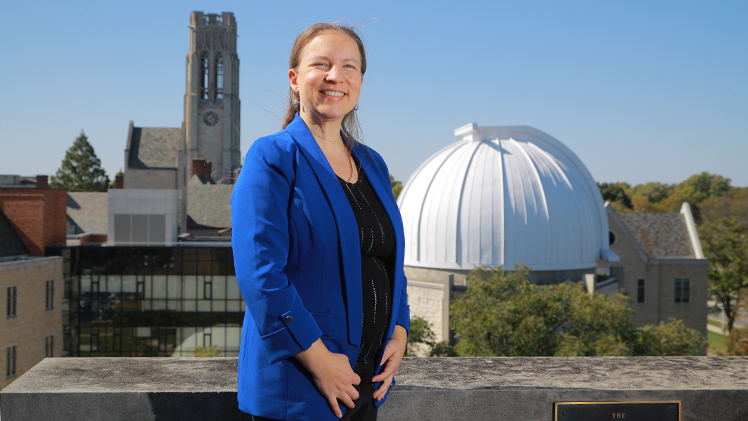Dr. Anne Medling, an assistant professor in the Department of Physics and Astronomy, is being honored by the Research Corporation for Science Advancement as a 2024 Cottrell Scholar.
The Cottrell Scholar Awards annually recognize early-career teacher-scholars in chemistry, physics and astronomy. Awardees are selected through a peer-review process based on their innovative research proposals and educational programs, toward which each scholar receives $120,000.

Dr. Anne Medling, an assistant professor in the Department of Physics and Astronomy, is being honored by the Research Corporation for Science Advancement as a 2024 Cottrell Scholar.
“In addition to funding for my proposal, which explores the role of supermassive black holes on galaxy evolution, I’m excited about joining this large community of scholars who share similar visions for strengthening science education,” Medling said.
“I’m also proud to be the third Cottrell Scholar named at UToledo, and to continue a legacy that demonstrates the commitment our faculty has to our students.”
Dr. Karen Bjorkman, a Distinguished University Professor in the Department of Physics and Astronomy, was named a Cottrell Scholar in 1999. Dr. J.D. Smith, a professor and director of the Ritter Astrophysical Research Center, received the same prestigious honor in 2012.
Bjorkman said she was excited for her colleague to join them in the network of teacher-scholars.
“The Cottrell Scholar program has been so valuable to me in my career,” Bjorkman said. “The funding is significant, especially because it comes at a relatively early stage in a scholar’s career and with relatively few strings attached. But even more important in my experience have been the connections with this amazing group of educators and researchers that stretch across the country and across academic disciplines. It’s led to a lot of collaborations.”
Medling, who joined UToledo in 2019, was previously recognized as an early-career researcher and educator through the National Science Foundation’s Faculty Early Career Development (CAREER) Program in 2023. CAREER Awards are among the foundation’s most prestigious, and Medling’s came with an award of more than $630,000 to fund her research into galaxy evolution, particularly through the mechanisms of accretion and feedback surrounding black holes, and as well her efforts to recruit and retain underrepresented students in the Department of Physics and Astronomy.
Medling will further these initiatives with her Cottrell Scholar Award.
In line with the proposal she submitted to the Research Corporation for Science Advancement, she intends to use data from state-of-the-art telescopes to test predictions that are developed with the sophisticated simulations typical of her field. These telescopes include the W.M. Keck Observatory in Hawai’i and the Atacama Large Millimeter/submillimeter Array, or ALMA, in Chile, and she’ll also use X-ray observations from an assortment of space-based observatories like the Chandra X-ray Observatory and NuSTAR.
She will focus on predictions related to galaxy evolution, specifically the extreme gravitational force of the supermassive black holes that lie in the center of most galaxies, which can transfer enormous amounts of energy and cause dramatic changes across the galaxy.
Her educational program supported by the award targets students who are just beginning their exploration of astronomy, including UToledo students enrolled in Frontiers of Physics and Astronomy beginning in fall 2024. Medling is interested in developing activities to build skills in areas such as dimensional analysis, units, equations, limits and translating math concepts into physics concepts. These will be packaged in interesting and accessible examples from different areas of physics, including green energy, music and — in line with her expertise — black holes.
“These skills, along with mentoring and curricular efforts to build up each student’s sense of belonging as a scientist, will improve retention and resilience among our students,” she wrote in her proposal.
The Research Corporation for Science Advancement is a private foundation that supports early stage, high-potential research in the physical sciences at colleges and universities in the United States and Canada. Medling is one of 19 Cottrell Scholars in its class of 2024.
“These awardees stand out not just for their excellence in teaching and research but for their potential,” said Daniel Linzer, president and CEO of the Research Corporation for Science Advancement. “The advancement of both science and society depend on the fresh ideas and the dedication to student learning that we see in Cottrell Scholars, including the class of 2024.”